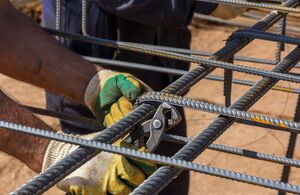TRA publishes initial conclusions on steel trade tariff quotas for developing countries
The TRA has published its initial conclusions on steel imports from developing countries in categories subject to the UK steel safeguard trade remedy measure

The Trade Remedies Authority (TRA) has published its initial conclusions in a Tariff Rate Quota (TRQ) review on steel imports from developing countries in categories which are subject to the UK steel safeguard trade remedy measure.
The TRA initially received a request to review the developing country exceptions on rebar, one of the categories of steel covered by the safeguard measure. The TRA has decided to review these exceptions for all other categories of steel covered, bringing forward its planned regular annual review to ensure a full response to any new trading patterns that emerged in 2022. The existing quotas were set in July 2022.
Initial conclusions
The TRA’s main findings were that:
- The 3% import share threshold for the developing country exception was exceeded in 37 instances in 2022, covering imports from ten countries across 16 categories of steel. The countries are Bahrain, Brazil, Egypt, India, Malaysia, People’s Republic of China (PRC), Tunisia, Turkey, UAE and Vietnam.
- This represents a modest increase from the 29 instances where the 3% threshold was found to have been exceeded in the TRA’s previous review of the developing country exception for steel safeguards carried out in summer 2022.
How tariff rate quotas work
Tariff rate quotas (TRQs) are part of the World Trade Organization (WTO) architecture. They specify how much of a product can be imported into a country before trade flows are subject to higher tariffs. Under the WTO’s Safeguard Agreement, imports from developing countries are excepted from safeguard measures if the goods imported are 3% or less of the total imports of that product and if, collectively, these low volume exporters account for no more than 9% of the total imports of that product. Members of the WTO are responsible for managing their own developing country exceptions to TRQs.
The TRA has assessed whether the exceptions for steel imports to the UK from developing countries should be amended based on updated import data. The TRA’s assessment considers imports from all developing countries, including countries which are currently excepted from the measure and those which are not. Imports from developing countries with separate exceptions under Free Trade Agreements or Economic Partnership Agreements have not been considered in the assessment
Comment on the TRA’s findings
If you think your business will be affected by the TRA’s conclusions, you can review the TRA’s initial conclusions and submit comments. YDeveloping Country Exception reviews are conducted using statistical analysis of HMRC trade data. You can submit comments on the TRA’s online case platform or to tq0030@traderemedies if not registered on the case, by 26 April 2023.
Once the TRA has completed its analysis, it will submit its recommendations for any changes to quotas to the Secretary of State for Business & Trade, who will make the final decision based on the TRA’s recommendation. If revisions to the TRQs are required, these will be provided in a notice published by the Department for Business & Trade.
Background information
- The UK’s trade remedies system follows WTO rules and is designed to make sure UK industries are not damaged by unfair trade practices or unexpected surges in imports.
- The Trade Remedies Authority is the UK body that investigates whether trade remedies measures are needed to counter unfair international trade practices and unforeseen surges of imports. The TRA has the power to investigate imports if it thinks they may need to be countered using a trade remedy measure applied at the border.
- The regulations defining how changes of circumstances can be considered in a TRQ review are set out in the Trade Remedies (Increase in Imports Causing Serious Injury to UK Producers) (EU Exit) Regulations 2019, Regulation 35B(9).
- Safeguard measures temporarily restrict imports of specified goods to help domestic industries adapt to changes in market conditions. They are one of the three types of trade remedies – along with anti-dumping measures which counter goods being dumped in countries at prices below their normal price in their country of origin and countervailing measures against subsidies – that are allowed under World Trade Organisation (WTO) rules.
- Trade remedy investigations were carried out by the EU Commission on the UK’s behalf until the UK left the EU. A number of EU trade remedies measures of interest to UK producers were carried across into UK law when the UK left the EU and the TRA needs to review each one to check if it is suitable for UK needs.
- The TRA will review the goods imported to the UK from each of the developing countries which are subject to the steel safeguard measure. If the TRA establishes that imports from a developing country have increased, taking the country’s imports above the 3% threshold for exception from the measure, it can recommend that imports from that country are now subject to the measure. This will mean that imports from that country will be subject to the TRQ residual quota which defines how much importers can bring in before paying higher tariffs, or to a quota specific to that country.
- The TRA can also recommend that a developing country which was previously within scope of the safeguard measure should now be excluded if its imports have dropped below 3% of total imports of the product entering the UK.